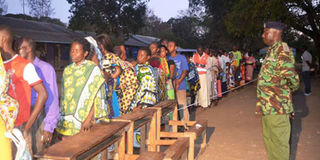If we had sufficient opportunities, tribe would recede to periphery of national discourse

Residents of Ganda in Kilifi queue to vote at Maziwani Primary School in the Malindi parliamentary by-election on March 7, 2016. PHOTO | KAZUNGU SAMUEL | NATION MEDIA GROUP
What you need to know:
Our leaders pay lip service to “fighting tribalism” while robustly exercising it in all their decision-making.
Political upheavals are analysed in terms of tribal conflict, and opportunities are publicly examined for the amount of benefit accruing to the tribe.
Of course all this is a smokescreen meant to hoodwink the real tribespeople, since in the lexicon of our leaders “tribe” means “my immediate family and cronies”.
We have a problem that we only acknowledge superficially and then do everything we possibly can to perpetuate it. It has been called various names, including Koigi wa Wamwere’s “negative ethnicity”, and plain “tribalism” as used in common discourse. It is not immediately clear why we demonstrate such behaviour that should, in a rational person, cause a huge amount of cognitive dissonance, but one theory would hold that we are stuck in a mental rut in which we know exactly what the problem is but are unable to think of a rational solution.
People learn through various mechanisms, but the most powerful and enduring method in my view is modelling, in which we learn most of our subtle traits and habits by observing authority or desired figures and – often unconsciously – copying whatever they do. It is my opinion that since the beginning of the last century, our forebears were taught to organise themselves in terms of ethnic pedigree, a form of organisation that was institutionalised and perpetuated beyond the colonial era through modelling.
The parties competing for power at independence were coalitions of tribal leaders purporting to negotiate on behalf of their communities. They convinced “their people” that they did everything in their tribes’ best interests. Implicitly or explicitly, their tribes gave them the mandate to negotiate on their behalf, and many of them went ahead to acquire massive wealth and political power for themselves. Little of these gains made it to their tribe-mates, many of whom continued to languish in poverty and deprivation.
Unfortunately, the perception that their leaders were fighting for power and wealth on behalf of the tribe blinded many people to the emerging inequities, even as the leaders and their families drifted further and further from the predominant social class of their people.
HIGHER IDEALS
In the absence of a culture of accountability and adherence to higher ideals, we remain captive to tribal rhetoric, behaving exactly as our ancestors behaved on the African savannah when they encountered a different breed. Despite our increased knowledge and understanding of world events and structures, we are unable to transcend our primal tuning that is constantly reinforced through modelling.
Today it does not matter that a man is a con man, a murderer or a bank robber, as long as he can muster some charismatic speech about “protecting the tribe” and use huge amounts of often ill-gotten wealth to bribe the electorate, he is almost certain of winning political power. As a result, he inspires young children who see the amount of respect and admiration the man garners in public gatherings and want to grow up and be like him.
Our leaders pay lip service to “fighting tribalism” while robustly exercising it in all their decision-making. Political upheavals are analysed in terms of tribal conflict, and opportunities are publicly examined for the amount of benefit accruing to the tribe. Of course all this is a smokescreen meant to hoodwink the real tribespeople, since in the lexicon of our leaders “tribe” means “my immediate family and cronies”.
Even the most sincere people with the intention of removing tribe from the centre of decision-making find themselves surrounded by situations that make this so difficult that they end up making recommendations that only serve to entrench the malaise. For instance, in our effort to improve diversity at workplaces in Kenya, we have passed legislation that requires that we regularly document the tribes of those we employ.
If we had sufficient opportunities for quality education and healthcare, and plenty of employment opportunities and a secure efficient environment in which to ply our trade anywhere, tribe would recede to the periphery of national discourse, where it truly belongs.
Lukoye Atwoli is associate professor of psychiatry and dean, school of medicine, Moi University.





